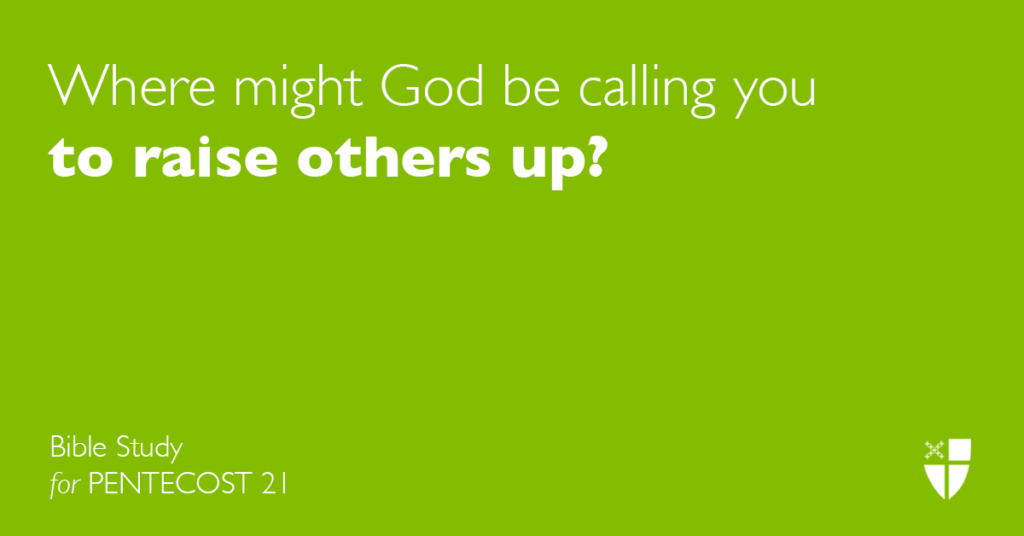Bible Study: Proper 25 (A) – 2020
October 25, 2020

Deuteronomy 34:1-12
Our text from Deuteronomy marks the end of Moses’ corporeal participation in the lives of the ancient Israelites. He spent much of his life being faithful to God’s call, even over his own self-doubts and insecurities. He shepherded the ancient Israelites during their time in the wilderness, acting as God’s emissary, even when the people were less than faithful. Moses was their deliverer, but he would not be the one who would carry his people into the Promised Land.
Still, Moses left behind Joshua, who was neither Moses’ son nor brother, to take up the mantle and to fulfill the covenant that God had made with him.
One of the things I think about when I read this passage is how Moses must have felt to see the Promised Land on the other side of the Jordan, but not be able to reach it. It must have been hard to be in his position – to be so close, but unable to see the promise fulfilled.
I think it’s not easy to be the driving force behind something and have to accept that you won’t be able to see it through. But Moses had prepared Joshua — he had made sure that someone would continue the work he had started.
- Where might God be calling you to raise others up? Where may God be asking you to make a way, but recognize that it’s not your voice that is the most important?
Psalm 90:1-6, 13-17
Psalm 90 is the only psalm attributed to Moses. When viewed through this lens, perhaps we can better feel the contours of the petition, asking when this season of trial may come to an end. The Israelites wandered in the wilderness for forty years, time for an entire generation to live and die, and for those younger to take up the mantle.
I see echoes of our current fight for civil rights, as so many of those who fought so valiantly in the 1960s and beyond are leaving us: John Lewis, C.T. Vivian, Joseph Lowery, to name just a few. But here we are, more than 50 years later, and yet we seem to be lost in that same wilderness.
- What part of the mantle from those whose shoes aren’t easy to fill are you willing to take up? What is your petition in this time of unease and uncertainty?
1 Thessalonians 2:1-8
1 Thessalonians is thought to be Paul’s earliest letter included in the New Testament. Having left the community at Thessalonica behind, Paul and his associates, Silvanus and Timothy, are sending their regards and well-wishes to the community with whom they became very familiar.
The letter speaks plainly of the contrast between Paul’s reception in Thessalonica and Philippi – received warmly in one and mistreated in the other. Nevertheless, he persists, continuing to do the work to which God has called him, sharing the Gospel.
- Sometimes when we are doing the work of God, the reception we get from others is not what we hope or expect it to be. In those times, how do you react? What fuels you and keeps you going in those moments?
Matthew 22: 34-46
In today’s Gospel lesson, we find Jesus being questioned by the Pharisees, as they try to trip him on his own words. Jesus turns around their questions and provides a question of his own for them to ponder.
Oh, the Pharisees and Sadducees — they are often the foils of our New Testament readings. Much like the Canaanites in the Old Testament, it is easy to see them doing the wrong thing and dismiss them as different than ourselves – doing things we would never do. But how different are they really?
- How often do we question God’s plan for us? Or push the edges until it resembles something more like what we may want it to be? How often do we try to discredit the messenger so we can feel better about not listening to the message?
Marisa Sifontes is a postulant in the Diocese of North Carolina and is in the third year of her MDiv studies at the Candler School of Theology at Emory University. Marisa was born and raised in Buffalo, New York. Her home parish is St. Martin’s in Charlotte, North Carolina, where she lived with her family for seven years prior to embarking on a two-year adventure in 2016 to travel around the country in an RV. Prior to that, she was a practicing attorney. Marisa is a Becoming Beloved Community scholar of the Society for the Increase of the Ministry (SIM). In 2019, she also participated in the Episcopal Preaching Foundation’s Preaching Excellence Program. She is currently serving as a seminarian at St. Luke’s Episcopal Church in Atlanta, Georgia.
¡No olvide suscribirse al podcast Sermons That Work para escuchar este sermón y más en su aplicación de podcasting favorita! Las grabaciones se publican el jueves antes de cada fecha litúrgica.


